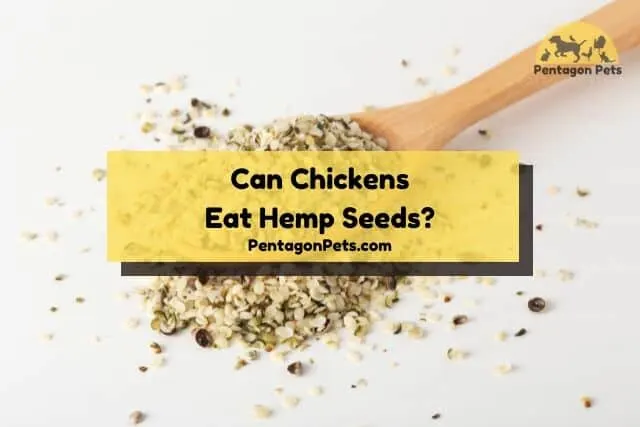Chickens are known for their ability to eat a wide variety of foods, as omnivorous creatures. Recently, there has been growing interest in incorporating hemp into their diet. Hemp, which comes from the Cannabis sativa plant, is known for its nutritional properties and is commonly fed to many animals, such as cows and horses. However, there is still much debate surrounding the safety of feeding hemp to chickens.
To address this concern, various studies have been conducted on the effects of hemp seeds and hemp seed meal in poultry diets. The analysis takes into account nutritional aspects, potential toxicity, and the overall health benefits for chickens consuming hemp. Additionally, considering the possibility of any negative impact on egg production and quality is crucial in determining the safety of hemp for chickens.

It’s important to understand the composition of hemp seeds and how it may influence the chicken’s diet. Hemp seeds are an excellent source of protein, essential fatty acids, and various important minerals. When appropriately included in a chicken’s diet, hemp provides an alternative and sustainable source of nutrition to support their overall health and well-being. However, caution must be exercised to avoid imbalances or potential adverse effects.
Can Chickens Eat Hemp – Is It Safe?
Chickens can safely consume hemp, as it offers various nutritional benefits. Hemp is a natural and highly nutritious plant that contains essential fatty acids, protein, vitamins, and minerals that promote optimal health for chickens.
Offering chickens hemp seeds as a component of their diet is a viable option. These seeds have high protein content, which is crucial for proper growth and muscle development. Additionally, they contain amino acids that help strengthen the immune system and improve feather quality.
Hemp seed oil is another form of hemp that chickens can consume. It is packed with omega-3 and omega-6 fatty acids, which are critical for brain development and overall well-being. Incorporating hemp seed oil into the daily diet of chickens can help enhance their egg production and quality, as well as support healthy skin and feathers.
However, it is essential to maintain a proper balance when adding hemp to a chicken’s diet. An excessive amount can lead to nutrient imbalances and dietary issues. It is recommended to consult a veterinarian or an experienced poultry nutritionist to define the appropriate ratios and adjustment of hemp in a chicken’s diet.
It is worth noting that hemp contains little to no cannabinoid compounds, such as THC or CBD, which are associated with marijuana. This ensures that it is legal to grow, feed, and consume in most regions, and it does not pose any risks or psychoactive effects on chickens.
The consumption of hemp by chickens is safe and beneficial for their overall health and development.
Should You Give Chickens Hemp to Eat?
Chickens can safely consume hemp products, such as hemp seeds or hemp meal, as part of their diet. Hemp is a nutritious, protein-rich plant source that offers various health benefits to chickens. It is known to have a high omega-3 and omega-6 fatty acid content, which can be beneficial for egg-laying hens.
When incorporating hemp into chickens’ diet, it is essential to remember moderation. Overfeeding can lead to obesity or other health issues. A proper balance of hemp with other feed sources is also important to ensure chickens receive adequate nutrients.
There are several ways to include hemp in a chicken’s diet:
- Mixing hemp seeds or hemp meal with their regular feed
- Sprinkling ground hemp seeds on top of their food
- Adding hemp products to treat mixes or scratch grains
Chickens typically enjoy the taste of hemp, making it an easy addition to their meals. However, it is crucial only to use high-quality hemp products, devoid of any pesticides, mold, or other contaminants.
Some potential benefits of feeding hemp to chickens may include:
- Improved feather quality and sheen
- Enhanced overall health
- Strengthened immune system
- Boosted egg production
Providing hemp in a balanced and measured manner can lead to various health benefits for chickens. While it is a safe and nutritious option to include in their diet, always supervise chickens after introducing hemp to ensure they don’t experience adverse effects. Stay mindful of portion control and avoid exaggerations in hemp feeding.
What to Look out for When Feeding Chickens Hemp
Feeding chickens hemp can provide benefits as it contains essential nutrients and can boost their overall health. However, it’s crucial to be aware of certain factors when introducing hemp into their diet.
Quality of Hemp: Ensure you’re giving your chickens high-quality and chemical-free hemp. Verify that the source is reputable and free from pesticides or harmful substances, as low-quality hemp may cause adverse effects in poultry.
Moderate Consumption: It’s essential to feed chickens moderate amounts of hemp. Overfeeding can lead to health issues, nutrient imbalance, and reduced egg production. Gradually introduce hemp seeds into their diet, starting with small amounts, and observe for any discomfort or changes in their eating habits.
Hemp Seed Composition: Hemp seeds are rich in protein, essential fatty acids, and micronutrients beneficial for chickens’ health. Pay attention to the nutritional balance in their diet, ensuring they receive adequate nutrients from other sources like grains, greens, and calcium supplements.
Potential Allergies: Although uncommon, some chickens might have allergies to hemp or sensitivities towards certain proteins in hemp seeds. Monitor your chickens closely for signs of allergies, such as swollen eyes, labored breathing, or excessive itching. Consult with a veterinarian if any unusual symptoms arise.
Remember to prioritize the wellbeing of your chickens by following these guidelines while feeding them hemp, and you can ensure a safe and beneficial dietary addition.
Can Chickens Eat Hemp Seeds?

Hemp seeds are packed with essential nutrients, making them an attractive feed supplement for chickens. They contain protein, healthy fats, vitamins, and minerals that contribute to a well-rounded diet for your poultry.
Chickens can consume hemp seeds safely, as they are non-toxic and pose no harm to their health. In fact, hemp seeds have been found to improve the quality of chicken eggs, primarily due to their high Omega-3 fatty acid content. Notably, a balanced ratio of Omega-3 to Omega-6 fatty acids in the diet can help reduce inflammation in the birds and promote overall health.
Feeding hemp seeds to chickens can be done in several ways:
- Whole hemp seeds: Chickens can eat whole hemp seeds, which they will crack open with their beaks to access the nutritious core. Whole seeds provide an engaging activity for the birds, encouraging natural foraging behavior.
- Hemp seed meal: Ground or crushed hemp seeds can be readily mixed with standard feed, making it an easy method of introducing hemp into your chickens’ diet.
- Hemp seed oil: Mixing a small amount of cold-pressed hemp seed oil into chicken feed can supply the birds with a concentrated dose of essential fatty acids.
It’s crucial to monitor and adjust the quantity of hemp seeds consumed by your chickens based on their overall diet. Hemp seeds should be gradually introduced to avoid disrupting the delicate balance of nutrients your chickens consume daily.
While there is currently limited scientific research on the specific effects of hemp seeds in chickens’ diets, poultry farmers and enthusiasts alike acknowledge the benefits of incorporating this versatile and nutritious seed.
This article was first published on August 7, 2023 by Pentagon-Pets.
Can Chickens Eat Hemp Hearts?

Hemp hearts, the soft inner core of hemp seeds, are a nutritious and safe food option for chickens. They contain essential fatty acids, such as omega-3 and omega-6, which are beneficial for the overall health of chickens. Additionally, hemp hearts are a good source of protein, vitamins, and minerals.
One of the reasons why hemp hearts are appropriate for chickens is their easily digestible nature. The digestion process in chickens utilizes the nutrients provided by hemp hearts efficiently, leading to healthy growth and development. Feeding hemp hearts to chickens can result in improved egg production, as well as stronger feathers and an enhanced immune system.
To feed chickens hemp hearts, you should mix them with regular chicken feed. Start by introducing a small amount of hemp hearts to their diet and gradually increase the quantity based on their acceptance. The ideal proportion of hemp hearts in the feed should not exceed 10% to maintain a balanced diet. Too much of any single food source can lead to nutritional imbalances.
It is essential to ensure the hemp hearts are sourced from reliable suppliers. Quality and safety should be significant considerations when purchasing hemp hearts, as low-quality or contaminated products can negatively impact the health of chickens.
Feeding hemp hearts to chickens is a safe and beneficial practice. This protein-rich and nutrient-dense food option contributes positively to the overall health and well-being of chickens. Just remember to consult a veterinarian or animal nutrition specialist for advice on the proper amount and frequency of feeding hemp hearts to your flock.
Pentagon Pet is the owner of this article that was first published on August 7, 2023.
Can Chickens Eat Hemp Bedding?

Hemp bedding is a popular choice for many chicken owners due to its absorbency, odor control, and low dust levels. However, some chicken keepers may wonder if it is safe for their birds to consume hemp bedding.
Chickens are notorious for pecking and scratching at their environment, and it is not uncommon for them to ingest small amounts of bedding material. In the case of hemp bedding, it is generally considered safe for chickens to consume in moderation. Hemp is a plant-based bedding material derived from the Cannabis sativa plant. It is important to note that hemp used for bedding contains very low levels of THC (tetrahydrocannabinol), the psychoactive compound found in high amounts in marijuana. This means that hemp bedding does not pose a risk of intoxication for chickens.
While occasional consumption of hemp bedding is not considered harmful, there are some potential concerns that chicken keepers should be aware of. Firstly, excessive ingestion of any bedding material may lead to impacted crops, a condition where the crop (a pouch in a chicken’s throat where food is stored) becomes blocked and unable to pass food into the digestive system. This can happen if chickens consume large amounts of indigestible material like wood shavings or pieces of hemp fibers.
Secondly, chickens who eat an excessive amount of hemp bedding can experience a drop in overall diet quality. Chickens require a balanced diet with specific nutrients to maintain their health and productivity. Consuming too much bedding material can dilute the nutrients they receive from their regular feed.
To reduce the risk of these issues, it is important that chicken owners keep a close eye on their birds’ behavior and take action if they notice their chickens consuming large amounts of hemp bedding. Providing adequate access to high-quality feed, fresh water, and grit for digestion can help to discourage chickens from consuming excessive amounts of bedding.
Additionally, maintaining proper hygiene and cleanliness in the coop can go a long way in minimizing the ingestion of bedding material. This involves regularly removing soiled bedding, keeping feeders and waterers clean, and preventing mold and bacteria growth in the environment.
Hemp bedding is generally safe for chickens to consume in small amounts. However, it is essential for chicken owners to monitor their birds, maintain good coop hygiene, and provide a balanced diet to ensure the wellbeing of their flock.
Can Chickens Eat Hemp Plants?

Hemp plants are generally regarded as safe for chickens to consume. These plants contain various nutrients, such as protein, fiber, and essential fatty acids, making them a potentially beneficial addition to a chicken’s diet. Moreover, hemp seeds are commonly utilized as a feed supplement for poultry, indicating that various elements of the hemp plant can indeed be safely consumed by chickens.
When feeding chickens hemp plants, it is essential to ensure that the plants have not been treated with harmful chemicals or pesticides. If the plants have been exposed to such substances, it could lead to health issues for the chickens consuming them. It is best to source hemp plants meant for animal consumption or, if growing your own, practice organic methods to limit any potential hazards.
While hemp plants themselves can be safe for chickens to eat, it is important to consider the quantity of the plant material that you are providing. Chickens should be offered a varied diet to ensure they are receiving all the necessary nutrients for optimal health. Therefore, hemp plants should be incorporated as a part of a more comprehensive feeding regimen, rather than a primary food source.
This article and its contents are owned by Pentagon Pets and was first published on August 7, 2023.
Chickens can safely consume hemp plants, as long as precautions have been taken to ensure the plants are free of potentially harmful substances.
